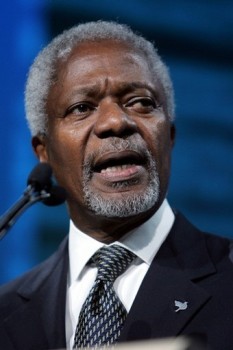Ex-UN SG criticize AU stance on ICC arrest warrant for Sudan’s Bashir
June 29, 2009 (WASHINGTON) — The former United Nations Secretary General Kofi Annan today criticized the position of African nations following the issuance of an arrest warrant by the International Criminal Court (ICC) for Sudanese president Omer Hassan Al-Bashir.

The arrest warrant drew strong rebuke from the African Union (AU) which said the move compromises the peace process in Darfur and some countries have threatened to withdraw unless the UN Security Council (UNSC) suspends the indictment.
The Voice of America (VOA) radio reported that the AU summit this week in Libya will try to come up with a unified position on the ICC arrest warrant against Bashir who is expected to attend according to Sudan’s official news agency (SUNA).
Libya along with a handful of African nations lobbied ICC member countries in the continent to withdraw from the court in a conference held in Addis Ababa this month but failed to secure such a commitment.
Annan said in an op-ed he write in the New York Times (NYT) that the AU summit is the first of its kinds since the Bashir arrest warrant saying that this will put “to test” the AU stated “stated commitment to battle impunity”.
“On the agenda is an initiative by a few states to denounce and undermine the international court. In recent months, some African leaders have expressed the view that international justice as represented by the ICC is an imposition, if not a plot, by the industrialized West,” the Ghanaian diplomat wrote.
However, Annan said that such a position “demeans the yearning for human dignity that resides in every African heart. It also represents a step backward in the battle against impunity”.
Many African figures accused the court of exercising selective justice by targeting cases in Africa only while turning a blind eye to crimes committed elsewhere.
“One must begin by asking why African leaders shouldn’t celebrate this focus on African victims. Do these leaders really want to side with the alleged perpetrators of mass atrocities rather than their victims? Is the court’s failure to date to answer the calls of victims outside of Africa really a reason to leave the calls of African victims unheeded?” Annan wrote.
The former UN chief said that three of the four cases handled by the ICC came at the request of the respective states including Uganda, Democratic Republic of Congo (DRC) and the Central African Republic (CAR).
The Darfur case was referred to the ICC by the UNSC under a Chapter VII resolution since Sudan is not a state party to the Rome Statue that established The Hague based court.
“The ICC represents hope for victims of atrocities and sends a message that no one is above the law. That hope and message will be undermined if the African Union condemns the court because it has charged an African head of state,” he asserted.
“The African Union should not abandon its promise to fight impunity. Unless indicted war criminals are held to account, regardless of their rank, others tempted to emulate them will not be deterred, and African people will suffer” he added.
He noted that the largest regional bloc in the ICC comes from Africa with is also represented by five of the eighteen judges in the court.
The article by Kofi Annan is the latest in a series of efforts by African figures and organizations to drum up support to the work of the ICC in Darfur,
More than a dozen African NGO’s, human right advocates and legal figures sent a letter this month to the AU urging its members to support the court and voice any concerns they have through upcoming conferences on ICC assessment and review.
Annan has been outspoken on the Darfur crisis during his term in office as the UN Secretary General. In 2004, he said that the international community needs to prepare for intervening in Darfur calling it the world’s worst humanitarian crisis’.
His remarks on Darfur made him a frequent target of criticism from the Sudanese government.
(ST)
